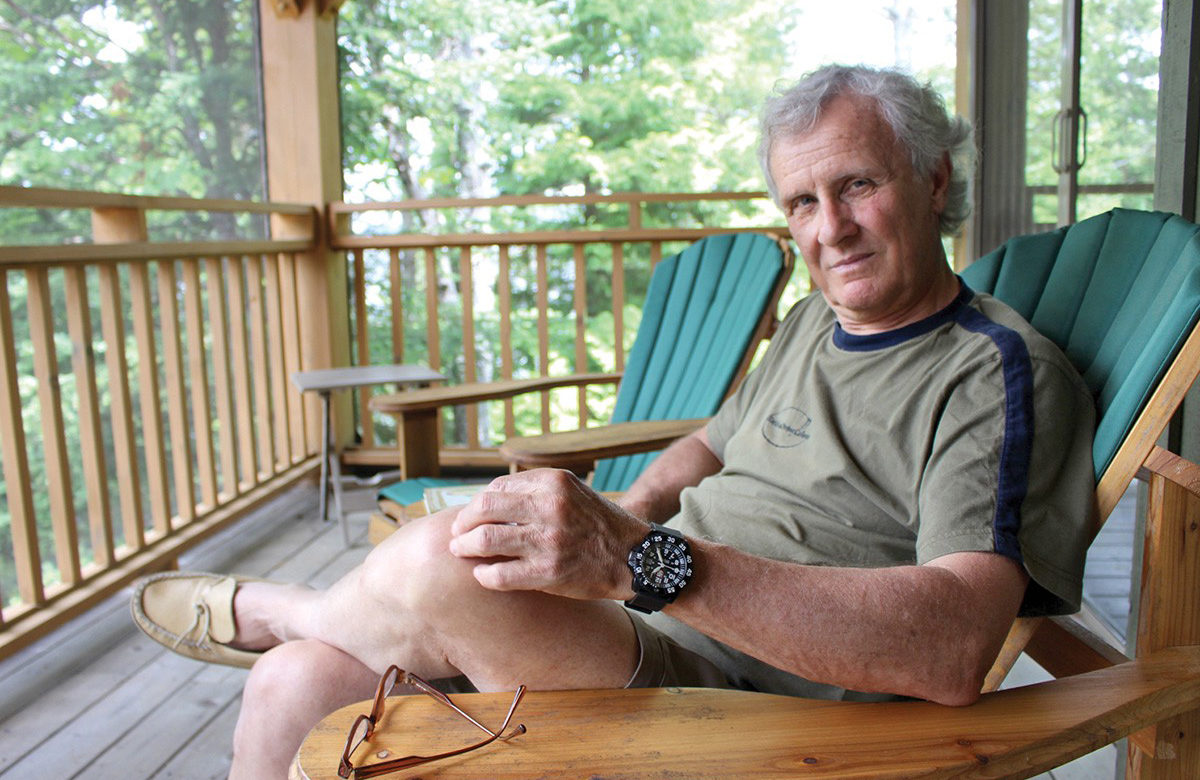He stands in front of the camera. Button-down shirt. Dark blazer. A breeze ruffles his grey hair. “Allen Pizzey. CBS News. Rome.” Rewind 34 years to the streets of Beirut. Fast forward 17 to the jungles of Rwanda. Sometimes rows of corpses fill the background, sometimes the tendrils of a Michelangelo fresco. But Pizzey’s voice remains the same. His blue eyes look straight ahead. It’s the look of over four decades of experience distilled into a 90-second clip. It’s the voice of a man who has been called “one of the most respected foreign correspondents of his generation” by colleagues at CBS in a tribute marking Pizzey’s official March 2016 sign-off.
When you see him sitting in shorts and a T-shirt on the deck of his Haliburton, Ontario cottage, it takes some getting used to. He offers you coffee. He leans back in a Muskoka chair. At first, it’s one of those cottage-country-July days where a lake glitters through a stand of white pine. Then, you’re in South Africa. A 26-year-old Brantford, Ontario native with a degree in business administration, a high-explosives license, and a stint as a soap salesman shows up at Cape Town’s Argus newspaper looking for a job. “He was mad,” Pizzey says of his editor, Humphrey Tyler. “He used to send you out to interviews and he’d say, ‘Can he break wind like a trumpet?’” In other words, get to know your sources.
Tyler taught Pizzey about more than breaking wind: “He told me, ‘If you can find a heartstring, boy, pluck it.’” This could mean standing in front of your cameraman in famine-plagued Ethiopia while a woman trying to reach Sudan with a baby on her back sits down to die in the dust. An estimated million would die from 1983 to 1985. “The image was stunning,” Pizzey says. But you have to speak clearly. Look straight into the camera. “You’re not there to share their pain,” he says, or cry, like his cameraman did. “You’re there to make millions cry. Move other people. That’s our job.”
Other rules kept Pizzey alive. He recalls his “first war” reporting for Argus Africa News Service—Angola, 1975—and the “little war wagon,” a bright orange Volkswagen Beetle, waiting for him at Luanda’s inter- national airport. “We start heading into town and I see these things in the air, streaks of light, and I said, ‘What the hell is that?’” The war wagon delivered them safely through the firefight and, a few months later, through the machine-gun fire of FNLA snipers, when the wagon got stuck on a sandspit. The story appeared on the front page of the weekend edition, but editor Wilf Nussey wasn’t entirely pleased. Rule number one: you can’t file if you’re dead.
“That was a really good rule,” says Pizzey, “and it governed my career forever after.” There’s really no point in getting killed, he says. “You become the story rather than report the story.” Besides, there were worse fates than dying. Rule number two: if you get killed on the job, you’ve already been fired.
Getting killed was a very real possibility in the days Pizzey showed up at war zones without “so much as a Band-Aid.” No one thought about things like insurance. “You just did it,” Pizzey says. Things have changed. Death is less likely when you’re wearing state-of-the-art body armour and riding around in Land Rovers with bulletproof glass. But nothing can protect a journalist from the threat of missing a story. Nussey warned: If you can’t find a story between the airport and your hotel, you will never be or have the right to call yourself a foreign correspondent. “You’ve got your eyes to see, your nose to smell,” says Pizzey, pausing to listen to the birdsong, to the paddles of two kayakers breaking the surface of Drag Lake. “If you do it right,” he says, “then politicians and people can’t say, ‘We didn’t know,’ because you did. We told you so. You knew bad things were going on, you knew people were suffering and dying and unjust wars were being fought. You knew. We told you. We showed you.”
Adapted from a story previously published in the Haliburton Echo.
